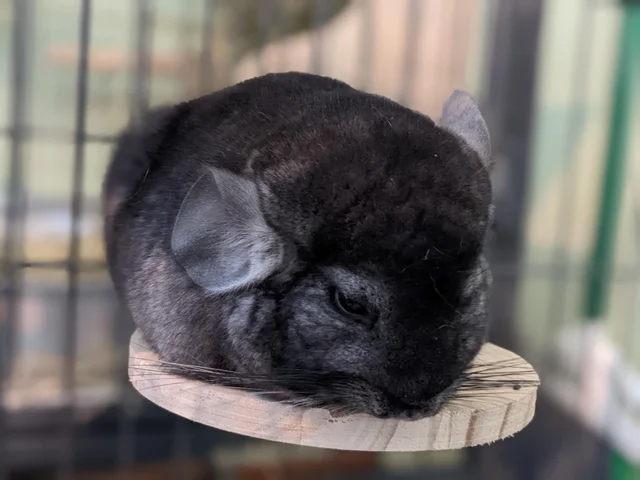Chinchillas are adorable and loving pets. They are intelligent, active, and social creatures, and can make wonderful companions. However, like all animals, chinchillas are susceptible to mental health issues that can affect their overall wellbeing. If left untreated, mental health problems can worsen and lead to serious physical illnesses in chinchillas. As a responsible pet owner, it is important to understand the common mental health issues in chinchillas and how to help them overcome these problems.
Common Mental Health Issues in Chinchillas
Chinchillas are susceptible to various mental health issues, and it’s important to be able to recognize the signs of these problems. Here are some of the most common mental health issues in chinchillas:
- Depression: Chinchillas can become depressed if they are lonely or stressed. Signs of depression in chinchillas include lethargy, loss of appetite, and lack of interest in activities they once enjoyed.
- Anxiety: Chinchillas can experience anxiety if they are exposed to loud noises, unfamiliar environments, or other stressors. Signs of anxiety in chinchillas include excessive grooming, loss of appetite, and hiding.
- Aggression: Chinchillas can become aggressive if they feel threatened or if they are not socialized properly. Signs of aggression in chinchillas include biting, scratching, and hissing.
- Compulsive Behaviors: Chinchillas can develop compulsive behaviors, such as over-grooming or overeating, as a way to cope with stress. These behaviors can lead to serious physical health problems if left untreated.
Causes of Mental Health Issues in Chinchillas
There are several factors that can contribute to mental health issues in chinchillas. These include:
- Lack of Socialization: Chinchillas are social animals and need to interact with other chinchillas to be happy and healthy. If they are kept alone or not properly socialized, they can become lonely and depressed.
- Environmental Stressors: Chinchillas are sensitive to their environment and can become stressed if exposed to loud noises, unfamiliar environments, or other stressors.
- Improper Diet: Chinchillas require a specific diet that is high in fiber and low in fat. If they are fed an improper diet, they can develop digestive problems that can lead to stress and depression.
- Lack of Exercise: Chinchillas are active animals that require plenty of exercise to stay healthy. If they are not given enough space to run and play, they can become lethargic and depressed.
Treating Mental Health Issues in Chinchillas
If you suspect that your chinchilla is suffering from a mental health issue, it’s important to take them to a veterinarian who specializes in exotic animals. The vet can perform a thorough examination to determine the cause of the problem and recommend the appropriate treatment.
Here are some general tips for helping your chinchilla overcome mental health issues:
- Provide a Stimulating Environment: Chinchillas need plenty of toys and activities to keep them mentally stimulated. Provide them with a variety of toys, such as chew toys, tunnels, and climbing structures.
- Socialize Your Chinchilla: If your chinchilla is kept alone, consider getting them a companion. Chinchillas are social animals and need to interact with other chinchillas to be happy and healthy.
- Reduce Environmental Stressors: Try to minimize loud noises and other stressors in your chinchilla’s environment. Keep their cage in a quiet area of your home, away from TVs, radios, and other sources of noise.
- Provide a Proper Diet: Make sure your chinchilla is receiving a proper diet that is high in fiber and low in fat. Consult with a veterinarian who specializes in exotic animals to determine the appropriate diet for your chinchilla’s specific needs.
- Encourage Exercise: Provide your chinchilla with plenty of space to run and play. Consider providing a large exercise wheel or allowing them to play outside of their cage under supervision.
- Consider Medication: In some cases, medication may be necessary to help your chinchilla overcome their mental health issues. Your veterinarian may prescribe medications, such as antidepressants or anti-anxiety medications, to help your chinchilla feel better.
Preventing Mental Health Issues in Chinchillas
The best way to prevent mental health issues in chinchillas is to provide them with a healthy and stimulating environment. Here are some tips for preventing mental health issues in chinchillas:
- Provide a Safe and Comfortable Living Environment: Make sure your chinchilla’s cage is large enough to allow them to move around and play comfortably. Provide plenty of soft bedding and a variety of toys to keep them stimulated.
- Socialize Your Chinchilla: If you have only one chinchilla, consider getting them a companion to keep them company. If you have multiple chinchillas, make sure they are properly socialized and getting along.
- Feed a Healthy Diet: Make sure your chinchilla is receiving a healthy and balanced diet that is appropriate for their specific needs. Consult with a veterinarian who specializes in exotic animals to determine the appropriate diet for your chinchilla.
- Provide Plenty of Exercise: Make sure your chinchilla has plenty of space to run and play. Provide a large exercise wheel or allow them to play outside of their cage under supervision.
- Minimize Stressors: Try to minimize loud noises and other stressors in your chinchilla’s environment. Keep their cage in a quiet area of your home, away from TVs, radios, and other sources of noise.







